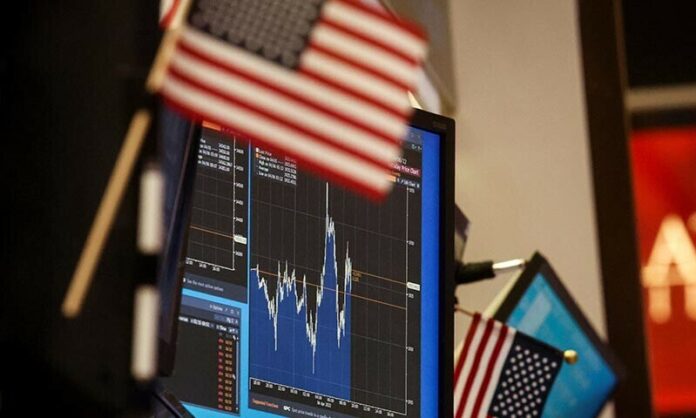SINGAPORE: Stocks ticked sideways on Tuesday while the dollar headed towards its largest monthly fall for years as investors braced for the trade war to be felt in earnings and economic data.
U.S. President Donald Trump’s tariffs have rattled faith in U.S. assets and even though numerous backdowns have helped the S&P 500 recover much of its early April losses, the dollar has managed only to steady, without a big rebound.
It slipped overnight when the U.S. Treasury Secretary Scott Bessent told CNBC it was “up to China to de-escalate” tariffs, which sit at 125% for most U.S. exports to China.
A holiday in Japan thinned currency trade in the Asia session, leaving most pairs steady. But at $1.1409 and up 5% in April, the euro is set for its largest monthly rise on the dollar in almost 15 years, while the dollar’s 7% drop on the safe-haven Swiss franc is the largest in a decade.
Nikkei and S&P 500 futures drifted higher, helped by officials foreshadowing a softening in automotive tariffs, though investors were holding out for more meaningful relief on the eye-watering 145% U.S. tariffs on China.
China has moved to make some exemptions but has held off on stimulus, betting Washington blinks first.
China’s foreign ministry also said President Xi Jinping had not spoken to Trump recently, nor were their respective administrations trying to strike a tariff deal, contradicting the U.S. president’s claim in an interview with Time magazine.
Hong Kong’s Hang Seng was up 0.3% in early trade and the mainland blue chip index fell 0.2%.
First-quarter GDP and April U.S. jobs figures due later in the week are likely to be supported by front-loaded purchases to beat out the new taxes, J.P. Morgan analysts said in a note, but a drop in China shipments suggests a reckoning may be due soon.
“The clock is ticking on hard data resilience,” said J.P. Morgan analysts in a note, which highlights a 42% peak-to-trough slump in China shipments to the U.S. in the past 10 days, which if sustained would reverberate through supply chains.
“A worrying decoupling of U.S.-China trade … now looks to be underway, and we expect the damage to build in coming weeks and months.”
Besides U.S. data, investors are watching for the outcome of Canada’s election – expected to return the Liberals to power – and inflation readings are due in Europe, beginning with Spain and Belgium later on Tuesday.
Power started returning to parts of the Iberian peninsula late on Monday after a huge outage brought most of Spain and Portugal to a standstill.
HSBC and big Chinese lenders report quarterly results on Tuesday, along with BP, Deutsche Bank, Adidas, Coca-Cola, General Motors and Visa.
Mega-caps Apple, Microsoft, Amazon and Meta Platforms report later in the week.
The weaker dollar has set gold surging and it was at $3,333 an ounce on Tuesday, up nearly 7% in April and nearly 27% for the year so far. Brent crude was a touch weaker at $65.68 a barrel.
Treasuries were untraded in Asia owing to Japan’s holiday, leaving benchmark 10-year yields at 4.206% and futures broadly steady.




